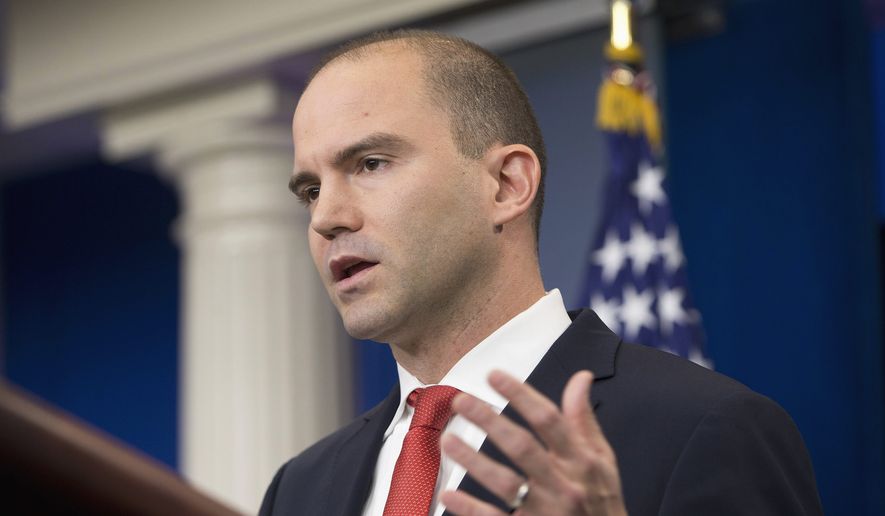The White House dismissed, with deep sarcasm, Thursday a move by a House committee to force presidential adviser Ben Rhodes to testify about the Iran nuclear deal, saying Republican lawmakers should put themselves under oath instead to explain their lies about the pact with Tehran.
“It’s not the administration, it’s Republicans who are demonstrably wrong when it comes to the Iran deal,” said White House press secretary Josh Earnest.
The White House said it will review the request by the House Committee on Oversight and Government Reform Chairman Jason Chaffetz, Utah Republican, for Mr. Rhodes to testify on May 17. But Mr. Earnest’s testy response suggested that Mr. Rhodes’ testimony was unlikely.
Mr. Chaffetz has said the panel will subpoena Mr. Rhodes if he refuses to appear voluntarily. Mr. Earnest did say the White House will not assert executive privilege in the matter.
Mr. Rhodes, the White House deputy national security adviser, revived Republicans’ opposition to the Iran deal last weekend by granting an interview in The New York Times Magazine that many saw as gloating. He boasted about marketing the Iran deal by creating a media “echo chamber” with inexperienced journalists who “know nothing.”
The article characterized Mr. Rhodes’ communications strategy as misleading the public about the timing of negotiations with Iran. The House committee has titled its hearing next week, “White House narratives on the Iran nuclear deal.”
Mr. Obama referred to the episode indirectly in an interview published Thursday in The Daily Targum, the student newspaper at Rutgers University, where he’ll deliver the commencement address this weekend.
“I am a strong believer in the First Amendment and the need for journalists to pursue every lead and every angle,” Mr. Obama said. “The general approach that I have consistently advocated for is maximum freedom of the press.”
The communications blunder on Iran came amid fresh reports that Tehran is testing missiles. Sen. Roy Blunt, Missouri Republican, noted a report on Monday that Iran tested a missile with a range capable of striking Israel.
“Over and over and over again we see Iran participating in hostile behavior, and somehow none of that behavior violates either the spirit or the letter of the agreement that was discussed as such an important breakthrough,” Mr. Blunt said on the Senate floor.
The White House, which structured the Iran deal to skirt the need for congressional approval, lashed out at the Republicans’ effort to probe its sales job.
Citing several Republican members of the committee and two Republican senators who have criticized the Iran deal, Mr. Earnest said the panel should question those lawmakers under oath instead to ascertain whether they were deliberately misleading the public about the impact of the agreement.
For example, Mr. Earnest said, Rep. Ken Buck of Colorado “promised in August of 2015 that Iran would get up to $100 billion to $200 billion in sections relief.”
“Congressman Buck is either wrong or lying, and he can discuss that with the committee,” he said. “He’s a member of the committee, so he presumably knows where the hearing room is. He can just show up at the appointed time and explain his false declaration.”
He said Rep. Cynthia M. Lummis of Wyoming, another committee member, has stated that the deal will lead to a nuclear-armed Iran, which Mr. Earnest termed “not true.”
“Why don’t we swear her in, and she can explain where she got this information?” Mr. Earnest said.
He also took to task Republican Sens. Ted Cruz of Texas and Tom Cotton of Arkansas, vocal critics of the deal. He noted that Mr. Cotton has predicted Iran would receive $150 billion in sanctions relief.
“Senator Cotton — wildly wrong or lying?” Mr. Earnest asked. “Let’s have Chairman Chaffetz get to the bottom of this.”
The administration itself cannot say how much Iran has received in relief from international sanctions in exchange for restrictions on its nuclear program. Mr. Earnest said “it’s a whole lot less” than the $100 billion or more cited by Republican critics, probably around $50 billion.
And he noted that an official with Iran’s central bank said they expected to receive about $30 billion after certain debts were repaid.
“It is, by all accounts, far less than the false criticism that was put forward by Republicans,” Mr. Earnest said.
The magazine article portrayed Mr. Rhodes as virtually the other half of Mr. Obama’s brain on foreign policy, more influential than other top White House advisers.
“I don’t know anymore where I begin and Obama ends,” Mr. Rhodes said.
A brother of CBS News President David Rhodes, Mr. Rhodes has been in the lead on some of the president’s key international initiatives, including the re-establishing of diplomatic ties with Cuba.
“Ben has had a very broad policy portfolio at the White House, and he has carried out his responsibilities honorably and with distinction,” Mr. Earnest said.
Asked if anyone at the White House has told Mr. Rhodes that his comments were ill advised, Mr. Earnest replied, “Not that I’m aware of.”
• Dave Boyer can be reached at dboyer@washingtontimes.com.




Please read our comment policy before commenting.